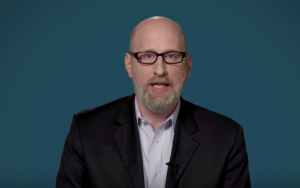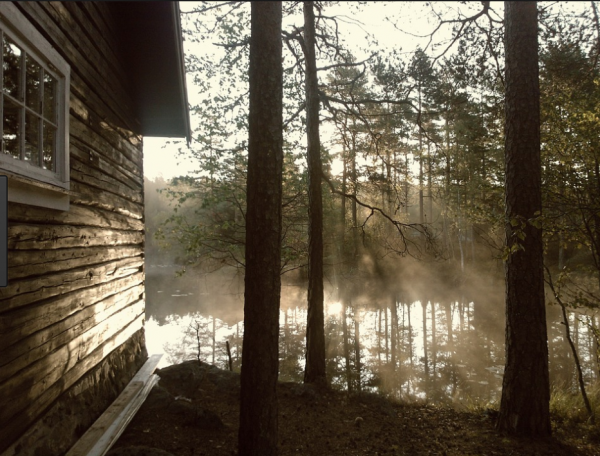
“What am I doing with my life?”
This is the first sentence of a romantic comedy named “Warm Bodies,” a cinematic adaptation of a novel by Isaac Marion. What makes the question interesting is that a zombie uttered it… a guy who’s been dead so long that he can’t even remember his name. He thinks it started with an “R.”
“R” (Nicholas Hoult) shuffles along aimlessly, waiting for a tasty human meal and little else. He grunts to his friends, but otherwise can’t express his thoughts. Death, you see, hasn’t stopped him from having an existential crisis, and he can’t shake the feeling that something’s very wrong with the world. “ What’s wrong with me?” he asks as he shuffles through… death.
One day, he eats a young man for lunch, including his brain which allows him to experience his victim’s life through flashes of memory. During this experience, he sees his victim had a girlfriend named Julie (Teresa Palmer) who is hiding from the zombie assault. Instead of having her for dessert, however, R falls in love with her. Watch the trailer here:
Warning: from here on out, there will be spoilers!
R keeps her safe in the airplane and gives her food. Then, in a montage worthy of any romantic comedy including driving in a BMW, spinning a few vinyl records, and “dancing,” Julie’s affection for him grows. Friendship is not easily found in the world of the dead, of course, and it affects R. His heart suddenly – inexplicably – beats.
Love, apparently, was his defibrillator.
I’ve suffered through my share of zombie flicks with my husband, who always appreciates the undead a great deal more than I do. Warm Bodies. However, finally united us. During the credits, we compared notes and realized we both interpreted the film as a Christian metaphor… and loved it! Yes, it seems improbable that this movie – directed by Jonathan Levine – could’ve intentionally been made to evoke a spiritual transformation into Christianity.
Notwithstanding, there were some poignant parallels:
First, and most obviously, R is dead and lost. In the opening sequence, we see he’s dead because, well, he’s a zombie. Then, he mutters, “I’m lost. I’m literally lost… We all are.” Of course, the Bible describes people without Christ as “dead in sin” though Jesus “came to seek and to save the lost.”
But then, something happens. As Julie and R grow closer in their friendship, he starts gradually showing signs of life. But he’s not really living, he’s still grunting and shuffling through life. One evening, before she went to sleep – zombies can’t sleep — she turns to him and extols his virtues.
“You’re a good person, R,” she says.
R knows he’s not, and he carries guilt over things he’s done in his zombie state. Mainly, he knows what Julie doesn’t: he was responsible for killing – even eating! – her boyfriend during the zombie attack during which they met. (Talk about an awkward meet-cute.) Romans 3:23 dispels the myth that we’re somehow inherently good. (“All have sinned and fall short of the glory of God.”)
“I’m s-s-sorry,” he’s somehow able to mutter.
After this confession, R falls into a slumber and dreams that one day the whole world might somehow be exhumed and revived. (Christians know this “revival” is possible, because of Christ. John 3:17 says, “For God did not send his Son into the world to condemn the world, but to save the world through him.”)
Then, R really changes. Blogger J.W. Wartick noted this about the climax of the movie:
“R grabs Julie and puts his body under her in order to save her as they jump from great height into a pool of water. R emerges from the water cleansed and alive. Does this theme echo at all with Christianity? I couldn’t help but immediately think of baptism. The scene is stunning. R falls into the water and as he descends and rises out, his old self–his “corpse”-ness– is washed away. He emerges restored. He is human. I found this not very dissimilar at all to casting off the old Adam. R was a new creation. So are we (2 Corinthians 5:17). I personally found this scene as central to the entire film. It was the emergence of life from death. It was stirring.”
The salvation presented in Warm Bodies is very touching. Though Julie explains to her dad that the zombies were “somehow curing themselves,” their transformation does not seem to be through the effort of the dead. Rather, they suddenly begin to feel it in their chests. They begin to remember and dream. They become capable of compassion and sacrifice. This is reminiscent of the Scriptures, which talk about God drawing men to Him and people encountering the joy-giving comfort of the Holy Spirit.
At the end of the movie, even after R’s “baptism” of sorts, Julie’s father isn’t convinced of his transformation and shoots R in the chest. To everyone’s amazement, he’s wounded.
“Corpses don’t bleed,” Julie exclaims. “He’s changed!”
The soldiers — after seeing him covered in blood — lower their weapons. Of course, blood is one of the most important themes in the Bible. The Israelites in captivity under Pharaoh covered their doorposts with blood so the angel of death would pass over their homes. In the New Testament, of course, the blood of Jesus literally flowed on Calvary to save us from our sins.
Okay, so here comes the inevitable, but it’s unsurprising that the theology of a zombie movie eventually breaks down. The main flaw of my Warm-Bodies-as-metaphor-for-Christianity theory is that R is – ultimately — saved by his own blood, not a merciful savior’s.
The movie, of course, isn’t meant to be a Sunday School lesson, or a theological course.
However, its touching and poignant message will resonate with all of us who want “to feel a little less dead.”
“Therefore, if anyone is in Christ, the new creation has come: The old has gone, the new is here!” 2 Corinthians 5:7









